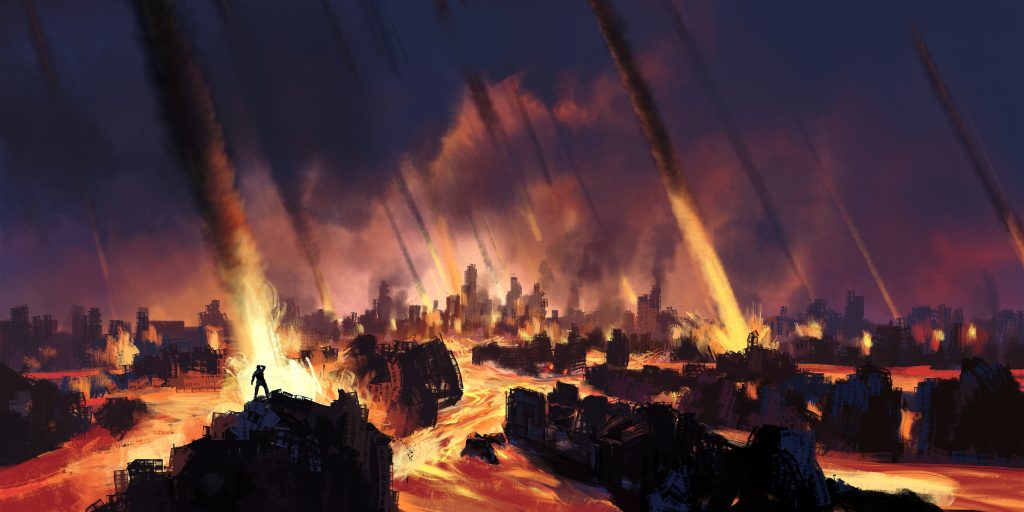People Are Quitting Jobs And Selling Cars After Becoming Convinced World Will End as We Know It Tomorrow

The end of the world has always been an oddly recurring appointment in humanity’s calendar. From the 2012 Mayan apocalypse to Y2K at the turn of the millennium, we have an extraordinary habit of predicting our own finale then carrying on with work and brunch plans when the day arrives. The latest entry in this long tradition is September 23–24, 2025, when, according to a South African pastor and the creative wildfire of TikTok, everything we know might crumble.
Pastor Joshua Mhlakela declared on YouTube’s CENTTWINZ TV that God had revealed to him a vision: during Rosh Hashanah the Jewish New Year and Feast of Trumpets the rapture would begin. Christians would be swept into the sky, the Earth would tremble, and judgment would reshape everything. His ominous warning “The rapture is upon us, whether you are ready or not” spread quickly across social platforms. The prophecy collided with TikTok’s endless appetite for spectacle, sparking the viral sensation now known as #RaptureTok.
How a Prophecy Became a Hashtag
What started as a niche religious broadcast ballooned into internet folklore. TikTok thrives on dramatic hooks, and Mhlakela’s words fit perfectly. Users paired his quotes with thunderous soundtracks, cinematic edits, and Bible verses, creating bite-sized apocalypse trailers for millions of viewers.
Some TikTokers took the prophecy to heart. They posted anxious testimonies, spoke of quitting jobs, or explained why they no longer needed houses or cars. Others flooded feeds with comedic skits.

Creators staged empty piles of clothing to mimic “raptured bodies,” while others joked about celestial dress codes asking whether sweats or Crocs would be permitted in heaven. The result was an odd mash-up of spiritual dread and parody theater, with both sides feeding the algorithm’s insatiable appetite for engagement.
What’s remarkable is how quickly the prophecy broke free of religious circles. Within days, it wasn’t just Christians or curious theologians discussing Mhlakela’s claims it was mainstream internet culture. Teenagers scrolling through the For You Page stumbled across countdown videos with flashing trumpets. Casual skeptics found themselves joking about brunch cancellations. Suddenly, the rapture wasn’t only about theology; it was a trending challenge, another viral filter on reality.
Life Decisions in the Shadow of Doom

Among the laughs and memes are real-world consequences. A TikTok user announced he had sold his car because he was “catching a flight to heaven.” Another claimed she gave away her house because “material things won’t matter.” These aren’t isolated stunts. Reports suggest others have quit jobs, abandoned plans, or prepared “post-rapture kits” for those left behind, complete with Bibles and instructions for survival.
Comedian Kevin Fredericks highlighted this trend in jest, but history shows it’s a familiar story. The Millerites of the 1840s sold possessions to await Christ’s return, an event that became known as the “Great Disappointment” when nothing happened. The Heaven’s Gate group in the 1990s prepared for extraterrestrial salvation, with devastating consequences. What’s different now is the live broadcast of such acts to millions. The end of the world is no longer a private leap of faith; it’s a viral video with comments, duets, and hashtags.
Behind the spectacle lies a sobering reality: people are making irreversible decisions based on a prophecy amplified by algorithms. Selling a car might be recoverable, but walking away from a long-term career or giving away a home carries heavy consequences. It’s a reminder that the internet’s entertainment value often masks the real lives being altered behind the screens.
Comedy as Coping Mechanism

Alongside believers, skeptics turned the prophecy into a playground for humor. Social feeds brimmed with jokes about rapture time zones, with users wondering if Australians would vanish first. Pet owners asked whether their cats and dogs could tag along, some insisting they’d refuse heaven if their pets weren’t included. On X, jokes ranged from “Not before payday” to memes about upcoming film releases being too important for God to cancel.
This comedy is more than cheap laughs it’s a coping tool. Humor, psychologists argue, is one of the most effective ways to process fear. By laughing at the idea of the skies splitting open, people defuse their anxiety about it. Yet comedy doesn’t erase the deeper undercurrents. For those raised in evangelical or apocalyptic traditions, #RaptureTok has stirred a phenomenon some call “rapture anxiety.” This condition stems from childhood teachings that emphasize constant vigilance for Christ’s return, leaving individuals with lingering dread that they might be “left behind.”
Accounts of rapture anxiety reveal panic attacks, nightmares, and even lifelong mental scars. A viral prophecy like Mhlakela’s can act as a trigger, bringing old fears back to the surface. While memes provide relief for some, others find themselves spiraling into genuine terror. The duality of #RaptureTok both hilarious and harrowing demonstrates the internet’s strange ability to amplify joy and trauma simultaneously.
The Endless History of Failed Endings

From Nostradamus to Nostalgia, failed doomsday predictions are everywhere. The Mayan calendar hype in 2012 sparked mass media specials and apocalyptic countdowns. Jeane Dixon’s 2020 prediction gained traction decades earlier. The millennium bug in 2000 caused widespread panic about planes falling from the sky and banks collapsing. Each new date inspires both panic and parody, only to collapse under the weight of tomorrow’s sunrise.
Even long before modern media, similar movements gripped communities. In medieval Europe, various sects predicted the year 1000 as the end. In 1524, astrologers insisted a great flood would destroy the Earth, prompting thousands in London to build boats. When the skies remained clear, disappointment followed, but not before people had uprooted their lives. The story is as old as humanity: we predict endings because endings make life feel urgent and meaningful.
Christian scripture itself cautions, “No one knows the day or the hour.” Yet new prophets continue to offer dates with conviction, and communities continue to believe. The pattern is predictable: anticipation, disappointment, and either denial or disillusionment. In the digital era, the added twist is instant meme-ification. A failed apocalypse doesn’t just fade into history it lingers online, preserved in viral clips and stitched jokes.
TikTok Turns Apocalypse Into Theater

If earlier generations had town criers and pamphlets, we now have TikTok. The platform thrives on drama, and few themes are more dramatic than the end of days. Some creators play the prophecy straight, urging repentance with trembling voices. Others half-jokingly admit to quitting jobs, blending sincerity with nervous laughter. Many lean into satire, crafting countdowns, fake rapture scenes, or tongue-in-cheek advice on what snacks to bring to heaven.
The ambiguity is part of the appeal. Audiences are often left wondering: is this creator genuinely terrified, or simply chasing likes? The answer sometimes doesn’t matter. TikTok rewards engagement, not accuracy, and the rapture prophecy became fuel for endless improvisation. Watching someone livestream their “last day on Earth” feels like reality TV colliding with theology. The result is a stage production where belief, fear, and parody are performed in equal measure.
In this sense, #RaptureTok is less about prophecy than performance. It’s a digital carnival where fear becomes content, belief becomes theater, and every user is both actor and audience. The rapture prophecy might not reshape the cosmos, but it has certainly reshaped timelines and feeds.
When Tomorrow Inevitably Arrives
The odds of September 23–24, 2025 truly ushering in the apocalypse are microscopic. By September 25, the sun will almost certainly rise, and life will continue: jobs, school runs, grocery lists, and memes. Believers who sold possessions may face regret. Skeptics will chuckle about how they spent the weekend doomscrolling. And the internet will move on to the next prophecy, the next hashtag, the next viral moment.
Yet the takeaway isn’t just laughter at believers or disbelief in prophecy. It’s recognition of how digital culture shapes our fears and fantasies. A single interview sparked millions of reactions faithful, mocking, anxious, and amused. The prophecy became less about theology and more about the theater of belief in an age where performance is everything.
Perhaps the lesson is not that people are foolish for believing, but that humanity is endlessly fascinated by endings. We tell stories about apocalypse not only because we fear death but because we crave significance. If history is a long, winding narrative, then what could be more meaningful than believing you are alive for the final chapter?
Tomorrow will come, as it always does. But the fascination with endings whether predicted by Mayan calendars, computer bugs, or TikTok pastors will never fade. In the end, the rapture may not arrive, but the stories we tell about it will linger, shared in memes, stitched videos, and nervous laughter long after the supposed hour has passed.
Loading...

